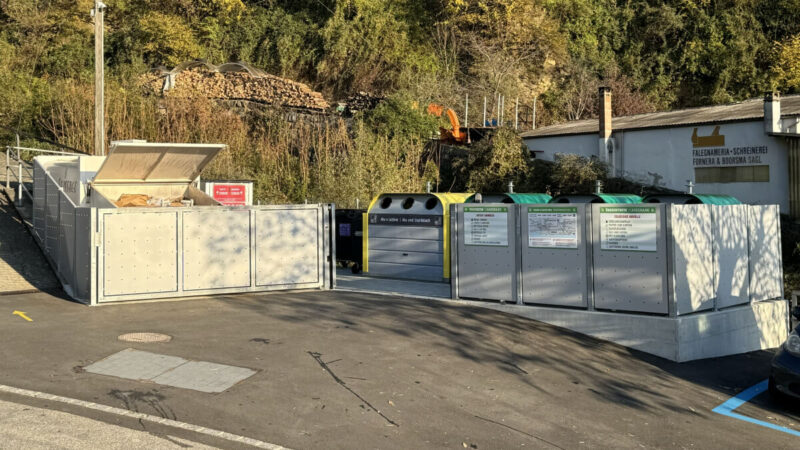Try to imagine a village, or a city district, with bags of waste at every corner or with overflowing dumpsters, or with paper and bottles scattered on the streets and in the parks ... It is not difficult: It has happened to all of us to find ourselves in front of such scenes during a trip or a holiday. And if we recover similar images in our memory, we better understand how important an efficient waste collection service is for the community. Important for residents and, in the case of Brissago, also for tourists, who represent an important economic resource. But to build an efficient service requires careful management and targeted and constant investments. Also with a view to the future.
And looking to the future, explains the municipality Reto Repetti, responsible for the Land Department, the main objective is to transfer the current ecocentre – the main one located in the Poss area – to the former purification centre owned by the Verbano purification consortium. “On that land – he explains – there are sufficient decommissioned spaces to accommodate a single large ecocentre. This is a project that is currently in a stalemate, but on which we continue to work, convinced that it is the ideal solution”.
Looking forward to the future, let's talk about the present: “In recent months, we have upgraded and modernised the collection centres, replacing paper, glass and PET containers and adding those for coffee capsules and batteries. We have also implemented, on the canton's recommendation, the collection of plastics with the Sammelsack system. In the Caregnano eco-centre, we then installed a fence that makes it possible to enforce the hourly access limits for users. The ideal would be to do the same with the eco-centre of the Schools, but from a logistical point of view it is clearly a problematic operation. Finally, we have improved and strengthened the signage of all eco-centres.”
And speaking of problems, the centre of the Poss is not what is called an ideal solution... "In fact, that structure poses several problems - says Repetti -. Problems that we know well and that we intend to solve, but whose solution passes, as I said, from the possibility of using, in a future that I hope will be near, the area of the former sewage treatment plant. It is clear that an ecocenter in the hills leads to inconvenience in terms of inconvenience and parasitic traffic in the hamlets. Let’s say that it is not really an ‘ecological centre’. But, I repeat, we are working to find solutions.”
From an economic point of view, Brissago's collection and disposal service is self-financing, but the situation must be constantly monitored. There is also substantial satisfaction on the part of the population. “Of course – says Repetti – some notes are not lacking, for example from those who would like a collection of plant waste door to door. But our truck is of a size that does not allow access to all areas of the cores”.
And speaking of trucks, a brand new one will arrive in the summer: “It will be more environmentally friendly in terms of emissions, and more compact, while maintaining the same amount of collection as the current one”, explains Giacomo Fiscalini, head of the Public Works service at the Technical Office, which managed the renovation of the collection points.
As regards the separate collection of plastic, which is mandatory for municipalities but not for citizens – a topic we have already dealt with in one of our previous newsletters – there are rather positive indications: “The population is responding well – says Fiscalini – especially considering that there is no obligation to use special bags. At the end of the year we will draw the sums”.
Both Repetti and Fiscalini underline a good level of respect for the rules by the citizens, a sign of a growing ecological sensitivity. There are some exceptions, because it would be utopian to think of the total disappearance of rudeness, but the malfeasance of using the ‘black bag’ (in order not to pay for the purple one) is gradually disappearing.
In a tourist municipality like Brissago, the volume of waste is strongly influenced by the presence of tourists and holidaymakers during the summer: in fact, in summer the harvest takes place three times a week (also for hygienic issues related to temperature) against the two laps in winter. While the collection of plant waste is limited to once a week. There is also the management of eco-centres in collaboration with the companies that deal with the disposal of plastics, cardboard, glass, aluminium, vegetables, etc., which is a daily job.
The numbers of waste
In conclusion, we asked Giacomo Fiscalini for some data on the waste produced and collected last year in Brissago.
Here they are: 6,200 quintals of urban solids; about 1,600 quintals of vegetables; 1,700 quintals of paper and 1,700 quintals of glass; 800 of bulky wood and 800 of material from demolitions; 600 quintals of other bulky and 100 of used clothes. Finally, since the beginning of this year, separately collected plastic has already reached 4 tonnes.
